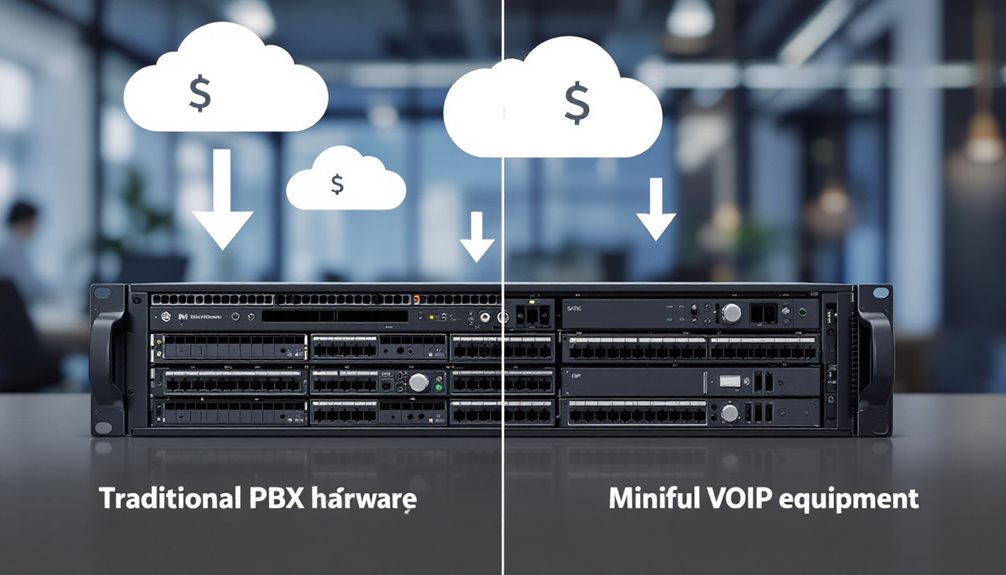Flexible VoIP solutions offer companies five significant advantages: substantial cost reduction through scalable infrastructure, geographic freedom enabling seamless remote work, enhanced customer service with intelligent routing capabilities, seamless integration with CRM and business tools, and robust disaster recovery protection. Companies implementing VoIP typically reduce telecom expenses by 30-60% while gaining enterprise-level features like automated call routing and advanced analytics. These technologies maintain professional communication standards regardless of employee location while ensuring business continuity during disruptions. The following benefits demonstrate why modern businesses are rapidly adopting this technology.
Expert Highlights
- Cost savings of 30-60% through scalable SIP trunking technology that eliminates wasteful overcapacity expenses.
- Geographic freedom allowing employees to access company phone systems from anywhere with internet connectivity.
- Enhanced customer service through automated call routing, analytics, and interactive voice response systems.
- Seamless integration with CRM platforms and business tools that eliminates redundant data entry and streamlines workflows.
- Robust disaster recovery capabilities including automatic call rerouting and cloud-based data storage for business continuity.
Cost Reduction Through Scalable Infrastructure

While traditional phone systems require significant upfront investment in physical hardware, VoIP infrastructure offers companies remarkable cost-saving opportunities through its inherently scalable design. Organizations facing communication budget constraints can easily add or remove lines as needed, eliminating wasteful overcapacity expenses. This pay-for-what-you-use model aligns perfectly with business growth patterns, enabling teams to expand communications capabilities without the prohibitive capital expenditures of conventional systems. With SIP trunking technology, businesses can experience telecommunications cost reduction of 30-60% while maintaining compatibility with existing PBX investments.
Geographic Freedom With Remote Work Capabilities
How can modern businesses break free from the geographical constraints that once defined workplace parameters? VoIP technology enables companies to maintain seamless communication regardless of employee location. Team members can access the company phone system from anywhere with internet connectivity, allowing organizations to hire talent globally while maintaining professional communication standards. This geographic flexibility supports remote work policies without sacrificing call quality or customer service capabilities. Advanced features like intelligent call forwarding ensure employees remain accessible and productive whether they’re working from home, traveling, or in different office locations.
Enhanced Customer Service With Advanced Call Features

Geographic flexibility represents just one dimension of VoIP’s business advantage; customer experience ultimately determines competitive success in today’s market. VoIP’s advanced calling features transform service interactions, enabling companies to respond professionally and efficiently to customer needs.
While geographic freedom creates opportunity, VoIP’s real power lies in elevating customer experiences that define market leaders.
- Automated call routing directs customers to appropriate departments without frustrating transfers
- Call analytics provide insights into peak times and common issues, improving staffing decisions
- Interactive voice response systems reduce wait times while capturing essential information
Many businesses report enhanced communication capabilities after implementing Cloud PBX systems that deliver enterprise-level features without dedicated IT staff requirements.
Seamless Integration With Existing Business Applications
Modern businesses rely on a diverse ecosystem of software applications to manage their operations, creating potential communication silos that can impede workflow efficiency. VOIP solutions address this challenge by seamlessly integrating with CRM platforms, project management tools, and email systems. This integration enables teams to make calls directly from applications, automatically log conversations, and share context across platforms—eliminating redundant data entry and creating unified information pathways throughout the organization. Specifically, VoIP systems offer seamless integration with popular CRM platforms like Salesforce and HubSpot to optimize customer service operations and enhance team productivity.
Disaster Recovery and Business Continuity Protection

When disasters strike, whether natural calamities or technical failures, businesses without robust communication contingencies face potentially devastating operational disruptions. VOIP systems provide essential protection through:
- Automatic rerouting of calls to mobile devices or alternative locations
- Cloud-based data storage ensuring critical contact information remains accessible
- Virtualized phone systems that can be rapidly redeployed on different hardware
Frequently Asked Questions
How Secure Are VOIP Solutions Against Cyber Threats?
VOIP solutions vary in security. While many providers implement encryption and authentication protocols, vulnerabilities exist. Companies should deploy additional safeguards like firewalls and regular security audits to mitigate potential attacks.
Can VOIP Quality Match Traditional Landline Clarity?
Modern VoIP technology can match or exceed landline clarity when properly implemented with adequate bandwidth. Users often cannot distinguish between the two during standard conversations in ideal network conditions.
What Hardware Is Required for Implementing VOIP?
Implementing VoIP requires basic components including IP phones or softphone applications, a reliable internet connection, routers with QoS capabilities, and potentially SIP servers depending on deployment scale and requirements.
How Does Internet Bandwidth Affect VOIP Performance?
Internet bandwidth directly impacts VoIP quality. Insufficient bandwidth causes call dropouts, latency, and jitter. Most providers recommend at least 100 Kbps per line for acceptable performance in business environments.
Are There Compliance Issues With VOIP in Regulated Industries?
Regulated industries face numerous VOIP compliance challenges including HIPAA, GDPR, and financial regulations. Organizations must implement proper encryption, audit trails, and data sovereignty measures to maintain regulatory adherence while using VOIP services.
Expert Final Thoughts
Flexible VoIP solutions represent a strategic investment for organizations seeking competitive advantages in today’s communication landscape. By reducing costs, enabling remote work capabilities, enhancing customer interactions, integrating with existing systems, and ensuring business continuity, these platforms deliver measurable operational improvements. Companies that implement adaptable VoIP technologies position themselves for greater efficiency, superior customer experiences, and resilience against unforeseen disruptions—ultimately driving sustainable growth in an increasingly digital business environment.






